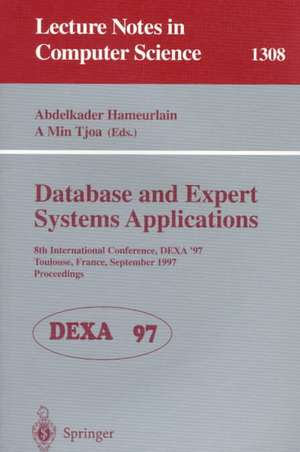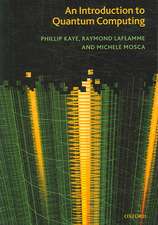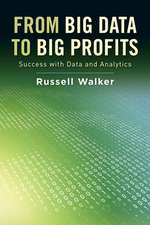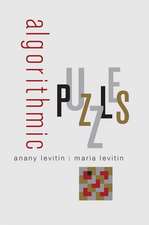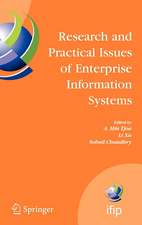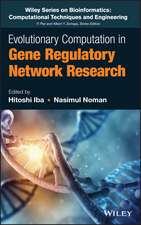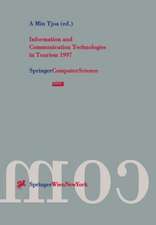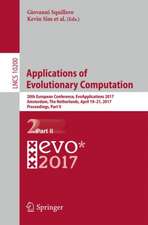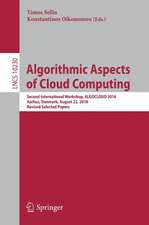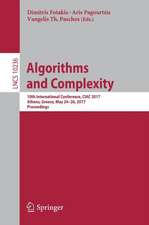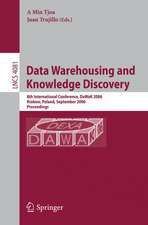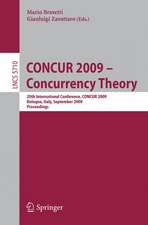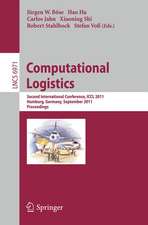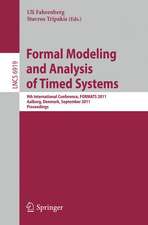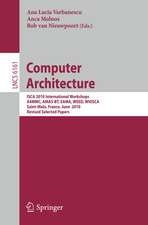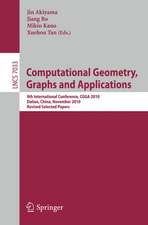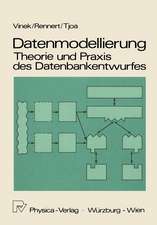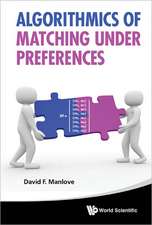Database and Expert Systems Applications: 8th International Conference, DEXA'97, Toulouse, France, September 1-5, 1997, Proceedings: Lecture Notes in Computer Science, cartea 1308
Editat de A. Hameurlain, A. Min Tjoaen Limba Engleză Paperback – 20 aug 1997
Din seria Lecture Notes in Computer Science
- 20%
 Preț: 1061.55 lei
Preț: 1061.55 lei - 20%
 Preț: 307.71 lei
Preț: 307.71 lei - 20%
 Preț: 438.69 lei
Preț: 438.69 lei - 20%
 Preț: 645.28 lei
Preț: 645.28 lei -
 Preț: 410.88 lei
Preț: 410.88 lei - 15%
 Preț: 580.46 lei
Preț: 580.46 lei - 17%
 Preț: 427.22 lei
Preț: 427.22 lei - 20%
 Preț: 596.46 lei
Preț: 596.46 lei -
 Preț: 449.57 lei
Preț: 449.57 lei - 20%
 Preț: 353.50 lei
Preț: 353.50 lei - 20%
 Preț: 1414.79 lei
Preț: 1414.79 lei - 20%
 Preț: 309.90 lei
Preț: 309.90 lei - 20%
 Preț: 583.40 lei
Preț: 583.40 lei - 20%
 Preț: 1075.26 lei
Preț: 1075.26 lei - 20%
 Preț: 310.26 lei
Preț: 310.26 lei - 20%
 Preț: 655.02 lei
Preț: 655.02 lei - 20%
 Preț: 580.93 lei
Preț: 580.93 lei - 20%
 Preț: 340.32 lei
Preț: 340.32 lei - 18%
 Preț: 938.83 lei
Preț: 938.83 lei - 20%
 Preț: 591.51 lei
Preț: 591.51 lei - 15%
 Preț: 438.59 lei
Preț: 438.59 lei - 20%
 Preț: 337.00 lei
Preț: 337.00 lei -
 Preț: 389.48 lei
Preț: 389.48 lei - 20%
 Preț: 607.39 lei
Preț: 607.39 lei - 20%
 Preț: 1024.44 lei
Preț: 1024.44 lei - 20%
 Preț: 579.30 lei
Preț: 579.30 lei - 20%
 Preț: 763.23 lei
Preț: 763.23 lei - 20%
 Preț: 453.32 lei
Preț: 453.32 lei - 20%
 Preț: 575.48 lei
Preț: 575.48 lei - 20%
 Preț: 585.88 lei
Preț: 585.88 lei - 20%
 Preț: 825.93 lei
Preț: 825.93 lei - 20%
 Preț: 763.23 lei
Preț: 763.23 lei - 17%
 Preț: 360.19 lei
Preț: 360.19 lei - 20%
 Preț: 1183.14 lei
Preț: 1183.14 lei - 20%
 Preț: 340.32 lei
Preț: 340.32 lei - 20%
 Preț: 504.57 lei
Preț: 504.57 lei - 20%
 Preț: 369.12 lei
Preț: 369.12 lei - 20%
 Preț: 583.40 lei
Preț: 583.40 lei - 20%
 Preț: 343.62 lei
Preț: 343.62 lei - 20%
 Preț: 350.21 lei
Preț: 350.21 lei - 20%
 Preț: 764.89 lei
Preț: 764.89 lei - 20%
 Preț: 583.40 lei
Preț: 583.40 lei - 20%
 Preț: 649.49 lei
Preț: 649.49 lei - 20%
 Preț: 341.95 lei
Preț: 341.95 lei - 20%
 Preț: 238.01 lei
Preț: 238.01 lei - 20%
 Preț: 538.29 lei
Preț: 538.29 lei
Preț: 665.93 lei
Preț vechi: 832.42 lei
-20% Nou
Puncte Express: 999
Preț estimativ în valută:
127.42€ • 133.04$ • 105.46£
127.42€ • 133.04$ • 105.46£
Carte tipărită la comandă
Livrare economică 04-18 aprilie
Preluare comenzi: 021 569.72.76
Specificații
ISBN-13: 9783540634782
ISBN-10: 3540634789
Pagini: 712
Ilustrații: XVIII, 694 p.
Dimensiuni: 155 x 235 x 37 mm
Greutate: 0.98 kg
Ediția:1997
Editura: Springer Berlin, Heidelberg
Colecția Springer
Seria Lecture Notes in Computer Science
Locul publicării:Berlin, Heidelberg, Germany
ISBN-10: 3540634789
Pagini: 712
Ilustrații: XVIII, 694 p.
Dimensiuni: 155 x 235 x 37 mm
Greutate: 0.98 kg
Ediția:1997
Editura: Springer Berlin, Heidelberg
Colecția Springer
Seria Lecture Notes in Computer Science
Locul publicării:Berlin, Heidelberg, Germany
Public țintă
Professional/practitionerCuprins
Connecting databases to the web: A taxonomy of gateways.- Multimedia federated databases on intranets: Web-enabling IRO-DB.- A terminological canonical data model for cooperating heterogeneous geographical information systems.- An extensible approach to reactive processing in an advanced object modelling environment.- Constructing the functional model.- Horizontal class partitioning in object-oriented databases.- Incremental inheritance model for an OODBMS.- A clustering technique for object-oriented databases.- Design and implementation of TEMPO fuzzy triggers.- Supporting and maintaining derivations: A declarative active approach active approach.- Modeling histories in object DBMS.- Activity threads: A unified framework for aiding behavioural modelling.- Linking object-oriented conceptual modeling with object-oriented implementation in Java.- Toward a unified data model for large hypermedia applications.- Managing the global behavior of composite objects.- Heuristic clustering of database objects according to multi-valued attributes.- Object-oriented environment for collaborative software design.- Refined termination decision in active databases.- A time-stamped authoring graph for video databases.- An approach to spatio-temporal queries.- An image retrieval system based on the visualization of system relevance via documents.- ImageRoadMap: A new content-based image retrieval system.- First steps to a formal framework for multilevel database modifications.- Versions of integrity constraints in multiversion databases.- Structuring the process of integrity maintenance.- A retrieval mechanism for semi-structured photographic collections.- Encapsulating multimedia contents and a copyright protection mechanism into distributed objects.- A priority-driven inheritance schemefor temporal-spatial structures in multimedia databases.- Relational database reverse engineering and terminological reasoning.- Efficient answer extraction of deductive databases modeled by HLPN.- Modeling negative and disjunctive information in relational databases.- Query-driven data allocation algorithms for distributed database systems.- A general multidimensional data allocation method for multicomputer database systems.- Distribution object oriented databases: An allocation method.- A meta message approach for Electronic Data Interchange (EDI).- Schemaless representation of semistructured data and schema construction.- M-ary commitment protocol with partially ordered domain.- Metadata for a digital library of historical documents.- Assembling documents from digital libraries.- Two-layer transaction management for workflow management applications.- Crash recovery in an open and safe nested transaction model.- A machine learning workbench in a DOOD framework.- Examining complex objects for type scheme discovery.- A framework for algebraic optimization of object-oriented query languages.- A library application on top of an RDBMS: Performance aspects.- Analysis of nearest neighbor query performance in multidimensional index structures.- A query language and interface for integrated media and alphanumeric database systems.- An algebraic query language for object-oriented data models.- The development of ordered SQL packages for modelling advanced applications.- Incremental update algorithms for materialized spatial views by using view derivation relationships.- Incremental maintenance of materialized views.- Federated information management for cooperative virtual organizations.- Extending a view mechanism to support schema evolution in federated database systems.- On the query treatment in federated systems.- Query processing and transforming for a federated database System.- Valid or complete information in databases —A possibility theory-based analysis—.- Handling imperfection in databases: A modal logic approach.- Text knowledge engineering by qualitative terminological learning.- A tesseral approach to N-dimensional spatial reasoning.- Guidance for requirements engineering processes.- Repository based software cost estimation.- Using a generic approach to support the construction of methods.- The role of structural events in behaviour specification.
